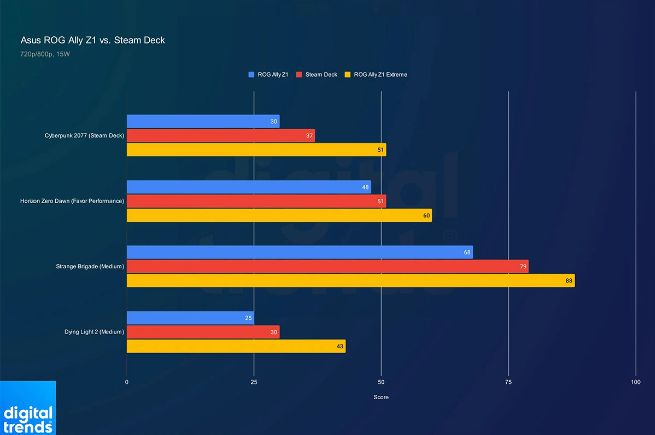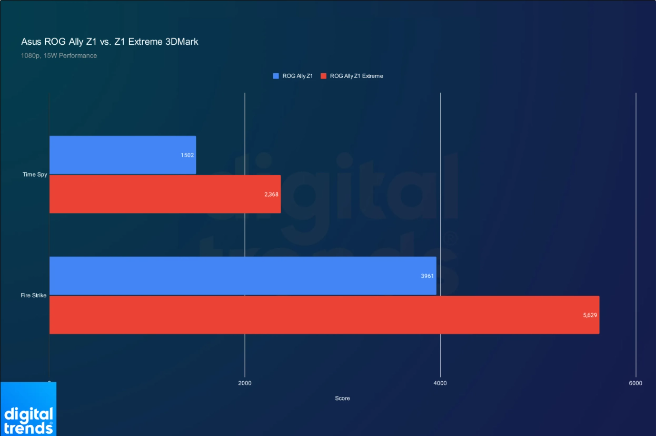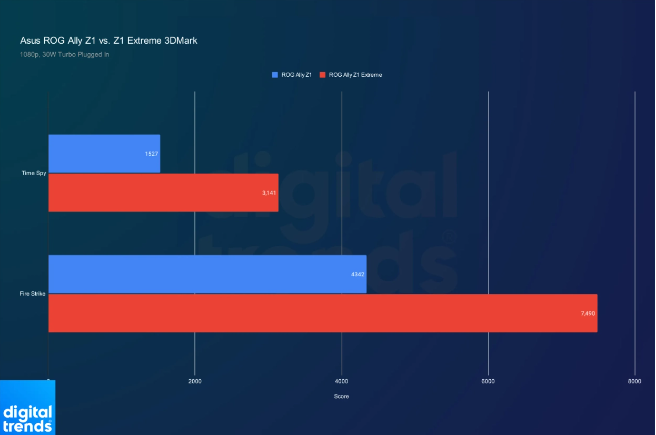 Technology peripherals
Technology peripherals
 It Industry
It Industry
 Z1 chip version ROG Ally handheld performance revealed: Steam Deck game performance wins
Z1 chip version ROG Ally handheld performance revealed: Steam Deck game performance wins
Z1 chip version ROG Ally handheld performance revealed: Steam Deck game performance wins
The ASUS ROG Ally gaming handheld console was released on September 18 and attracted widespread attention. There are two versions of this handheld console, including the Z1 Extreme version in overseas markets, starting at $699. In the domestic market, there is only the Z1 Extreme version, with a starting price of 4,999 yuan.

ROG Ally Z1 Extreme version is equipped with a new AMD customized chip and has excellent performance. However, with the lower performance Z1 version, foreign media reviews are unsatisfactory, and are even accused of being inferior to competitor Steam Deck

According to the review of foreign media DigitalTrend, the Z1 version only has 6 Zen 4 CPUs cores, while the Z1 Extreme version has 8 cores. Worryingly, the Z1 version also has fewer GPU cores, with only four RDNA 3 GPU cores, which is only one-third of the Z1 Extreme version. In addition, the cache capacity of the Z1 version has also been reduced, from 8MB L2 of the Z1 Extreme version to 6MB L2

In terms of game performance, the Z1 version of the ROG Ally handheld game overall The frame rate is not as good as the Steam Deck handheld console, and the gap is even wider compared to the Z1 Extreme version. In 3DMark testing, when running in the default 15W mode, the ROG Ally Z1 version scored 37% lower than the Z1 Extreme version in the 3DMark Time Spy test and 30% lower in the Fire Strike test

In Turbo mode, with both devices plugged in and delivering 30W of power, the ROG Ally Z1 version’s Time Spy test score dropped by 51%, while the Fire It dropped by 42% in the Strike test.
According to the editor’s understanding, although the performance of the ROG Ally Z1 version is not as good as the Steam Deck handheld console, the Steam Deck is more stable, easier to use, and cheaper. Although the ROG Ally Z1 Extreme version is more powerful, it is more expensive and bulkier, but it has higher peak performance and wider playability
The above is the detailed content of Z1 chip version ROG Ally handheld performance revealed: Steam Deck game performance wins. For more information, please follow other related articles on the PHP Chinese website!

Hot AI Tools

Undresser.AI Undress
AI-powered app for creating realistic nude photos

AI Clothes Remover
Online AI tool for removing clothes from photos.

Undress AI Tool
Undress images for free

Clothoff.io
AI clothes remover

AI Hentai Generator
Generate AI Hentai for free.

Hot Article

Hot Tools

Notepad++7.3.1
Easy-to-use and free code editor

SublimeText3 Chinese version
Chinese version, very easy to use

Zend Studio 13.0.1
Powerful PHP integrated development environment

Dreamweaver CS6
Visual web development tools

SublimeText3 Mac version
God-level code editing software (SublimeText3)

Hot Topics
 1377
1377
 52
52
 Top 10 Best Free Backlink Checker Tools in 2025
Mar 21, 2025 am 08:28 AM
Top 10 Best Free Backlink Checker Tools in 2025
Mar 21, 2025 am 08:28 AM
Website construction is just the first step: the importance of SEO and backlinks Building a website is just the first step to converting it into a valuable marketing asset. You need to do SEO optimization to improve the visibility of your website in search engines and attract potential customers. Backlinks are the key to improving your website rankings, and it shows Google and other search engines the authority and credibility of your website. Not all backlinks are beneficial: Identify and avoid harmful links Not all backlinks are beneficial. Harmful links can harm your ranking. Excellent free backlink checking tool monitors the source of links to your website and reminds you of harmful links. In addition, you can also analyze your competitors’ link strategies and learn from them. Free backlink checking tool: Your SEO intelligence officer
 Building a Network Vulnerability Scanner with Go
Apr 01, 2025 am 08:27 AM
Building a Network Vulnerability Scanner with Go
Apr 01, 2025 am 08:27 AM
This Go-based network vulnerability scanner efficiently identifies potential security weaknesses. It leverages Go's concurrency features for speed and includes service detection and vulnerability matching. Let's explore its capabilities and ethical



